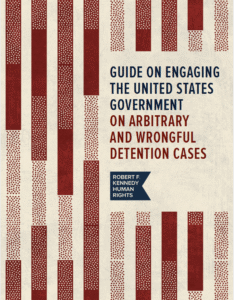Robert F. Kennedy Human Rights is proud to join human rights organizations around the world in denouncing growing threats of a “military option” in Venezuela. On August 15, we signed a public letter clearly stating the risks of such a military strategy.
We, the undersigned organizations, members of the International Coalition of Human Rights Organizations in the Americas, reject the statements issued this past Friday, August 11, by the President of the United States, Donald Trump, in which he expressed that he would not rule out a military option in the face of the Venezuelan crisis. This rejection has also been expressed by Argentina, Brazil, Colombia, Mexico, Paraguay and Uruguay.
In the wake of these statements, we would like to indicate that any measure that attempts to resolve the grave situation currently experienced by Venezuela cannot resort to violence. Since April, more than 120 people have died in peaceful protests organized by various sectors of civil society. Moreover, the economic, food and health crisis is getting worse. It is fundamental that all proposals developed by the international community and any individual countries do not provoke more suffering and pain for this country’s residents.
Moreover, the United States has a long history of unilateral intervention in the hemisphere’s conflicts. The threats made by the United States’ president fuels the justifications used by the Venezuelan State to continue implementing policies that exacerbate the situation of scarcity and repression. Any military action would further harm the Venezuelan people.
The only option to solve the problems in Venezuela should be a peaceful exit. The last five months have been marked by serious violations of human rights, among them thousands of arbitrary detentions, illegal forced entries, invasions of privacy, restrictions on the exercise of the rights to freedom of expression, association and assembly, harassment of human rights defenders, limiting political rights, the use of military tribunals to prosecute citizens detained in protests, among other repressive acts undertaken by the Venezuelan government.
In addition, there has been a total dismantling of the Venezuelan democracy, which intensified beginning in March with the Supreme Court of Justice’s failed attempt to assume Parliamentary functions, as well as the recent dismissal of the Attorney General. The installation of the National Constituent Assembly on July 30, 2017, which ignored the referendum that was held two weeks before and the constitutional process for its convening, represents the abolition of the 1999 National Constitution and the lack of legal protection for Venezuelans’ fundamental rights.
Throughout, the State’s response has been to increase violence and try to isolate itself even more from the rest of the region, as its decision to leave the Organization of American States (OAS) demonstrates. The current crisis has resulted in an exodus of thousands of Venezuelans, mostly, for other countries in the region.
Finally, because this is a crisis with regional consequences, the responses to the situation in Venezuela should be multilateral, with the explicit aim of not exacerbating the country’s political and regional isolation. Furthermore, these proposals should seek to strengthen international human rights mechanisms so that they can respond more effectively to victims of the violence that has been unleashed in the country, as well as the migrants and refugees who seek to leave.
To that effect, as undersigned organizations, we support all serious and non-violent measures which promote and reinforce the reestablishment of democracy and reject violence. In solidarity with the statement of various Venezuelan civil society organizations, we demand that human rights experts from the Inter-American Commission on Human Rights and the United Nations visit the country.
Organizaciones Firmantes
Regional
Asociación Interamericana para la Defensa del Ambiente, AIDA
Centro por la Justicia y el Derecho Internacional (CEJIL)
Comité de América Latina y el Caribe para la Defensa de los Derechos de las Mujeres (CLADEM)
Due Process of Law Foundation (DPLF)
Iniciativas Globales por los Derechos Humanos, Heartland Alliance for Human Needs & Human Rights
Instituto Internacional sobre Raza, Igualdad y Derechos Humanos
Robert F. Kennedy Human Rights
Bolivia
Oficina Jurídica para la Mujer de Cochabamba
Chile
Centro regional de derechos humanos y justicia de género, Corporación Humanas
Colombia
Grupo Interdisciplinario por los Derechos Humanos (GIDH)
Colectivo de Abogados José Alvear Restrepo (CCAJAR)
Comisión Colombiana de Juristas
Corporación Sisma Mujer
Costa Rica
Defensa de niñas y niños- Internacional DNI Costa Rica
El Salvador
Red Para la Infancia y la Adolescencia de El Salvador (RIA)
Ecuador
Centro de Documentación en Derechos Humanos “Segundo Montes Mozo S.J.” (CSMM)
Terra Mater
Comisión Ecuménica de Derechos Humanos (CEDHU) de Ecuador
Guatemala
Asociación para el Estudio y la Promoción de la Seguridad en Democracia (SEDEM)
Fundación Myrna Mack
México
Abogadas y Abogados para la Justicia y los Derechos Humanos
Asistencia Legal por los Derechos Humanos A.C. (ASILEGAL)
Centro de Derechos Humanos Miguel Agustín Pro Juárez
Nicaragua
Movimiento Autónomo de Mujeres
Centro Nicaragüense de Derechos Humanos – CENIDH
Perú
Asociación Pro Derechos Humanos (APRODEH)
Paz y Esperanza
Uruguay
Instituto de Estudios Legales y Sociales (IELSUR)




